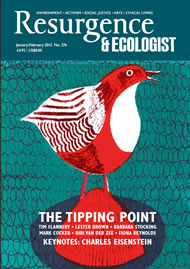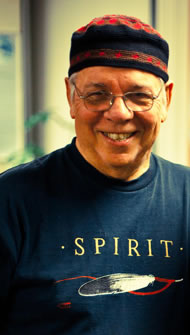The last half-century has harboured some of the most striking changes in Western civilisation. Great advances in health care, technology and our scientific understanding of the physical world have brought many boons to our societies that would seem almost impossible for earlier generations to imagine.
Along with greater longevity and standards of living in the human world, however, have come mass extinction in the non-human world, environmental degradation, and climate-changing pollution from human industry that is changing critical Earth processes all around us.
It is within such a context that Edmund O’Sullivan has been striving for more than 40 years to create a meaningful vision for education in the 21st century. A vision that draws its breath from a timeless story that is forever unfolding in the eternal present: the story of the universe. For Ed and his many students, this story provides a unifying concern: the wellbeing of the Earth and the human species within the Earth community.
I recently met with Ed at the Centre for Transformative Learning within the University of Toronto to discuss his work and to gain a deeper insight into his educational vision. I met a man of significant humour, foresight and curiosity whose books and teaching have spanned a long career of ‘waking up’ others around him to both the invisible hand of capitalist society and the intangible beauty of the natural world. The two frequently overlap in his work. Just as the full effects of the global market economy can be ubiquitous and unnoticed in Western society, so too can the myriad processes of the natural world. Uncovering them can therefore often be part of the same process of awakening a critical consciousness in the hearts and minds of his students.
Through such critical exploration of our present mode of development, Ed says, we come to see that “our consciousness is infested with signals of consumption” and with a false ideology that champions the rich whilst bemoaning the poor. Following this critical consciousness we come to understand that we are colonised by capitalism and the consumer economy of the industrial world.
At the same time, whether we are looking at the stars or just down at our hands, if we become mindful of the processes that occurred and are occurring in order to bring both about, we can at once begin to hear the faint telling of the universe story, of which we are most thoroughly a part. “We’re in a great mystery”, he says. “That’s where the awe comes from – at every level – when you stop to think about it.”
Ed’s work has been to increase awareness of these two critical observations, an interesting challenge that entails reflecting on a wide array of ideas from sociology and philosophy to physics and ecology. With such educational scope, the frames of reference for his work are greatly expansive. Within his books and our conversation, he references countless other books, films and artworks as well as diverse roll-calls of philosophers, historians and poets that have informed his thinking. The greatest influence of these is clearly Thomas Berry.
Indeed, it was meeting Berry in the late 1970s that set Edmund on his own learning journey, which would eventually see him guiding so many others on theirs. A cultural historian and Passionist priest, Berry worked to resituate the human story within the larger narrative of the primordial flaring forth of the cosmos. From the origin of origins, the universe story traces the original energy of the Big Bang through to the birth of the stars and the emergence of galaxies, solar systems and eventually the Earth, from which all life has emerged. This is the universe story, and it has been Ed’s calling to tell it throughout his educational career.
Coming back down from the stars, my attention is drawn back into the room as Ed tells me “the end of consumer industrial society is at hand. It’s become morbid to everyday living and it’s inequitable. There’s no diversity any more as everything gets forced into a market vision of the world. This is coming to an end and we have to be able to learn how to negotiate the end of this period, not only how to survive but also to have a critical understanding of what’s going on.”
This critical understanding and refound cosmological sense can be transformative in a profound way. Mechanistic, traditional models of the individual as Homo economicus, with an absurdist existential conundrum of being stranded on a dead rock in the darkness of an indifferent cosmos, fall away. So too do religious fundamentalist perspectives of being created separately from the rest of Nature in order to rule over it. Instead, the universe story awakens us to being part of an evolutionary process, one in which we can begin to acknowledge that the fabric of our being is the stuff of stars, co-muddled together as part of the process of the cosmos’ unfolding. “Part of transformative learning is not only understanding social processes but also to have a grounding in yourself so that you understand that actually you are a part of an evolving process.”
The lesson of this story – that we are indeed a way for the universe to know itself – is at the heart of Ed’s work and calls for nothing less than a paradigmatic shift in consciousness concerning human development. A shift that undoubtedly calls for education that is truly transformative.
Throughout our conversation, Ed makes me realise even more that on humanity’s collective walk forwards in time, we find ourselves in a period of transition with one foot behind us in the industrial, consumer society of the past and our other foot yet to land on solid earth. The path before us is not just one of human significance, but one of great geo-biological significance to the story of the planet itself.
“The evolutionary process in which we are living”, he says, “wants to grow and wants to create and I think we need to be able to pick up on the momentum of creativity and find out where we are in the process.”
We still have much to learn, therefore, in order to walk, let alone run. Having retired in 2004, Ed tells me he has learnt more in the last eight years then he has in his whole life. He sees the processes of evolution more and more and at all levels now then he has ever done. “I have a greater sense of an evolving process of which I am a part. There’s a beauty in it and a wholesomeness – a sense of the sacred.”
When I ask him about the world in 2050, he says: “If we are still here by then, we will have a different attitude towards many different things, including ourselves, in ways that we couldn’t imagine.” Just as earlier generations could not imagine our world now, we cannot foresee our future but it is Ed’s vision that our shared future is one full of awe and reverence for the world. A vision that I hope can teach us all to see the world a little differently over the next 40 years in order to help us to make some of the most striking changes Western civilisation has ever seen. Changes that future generations may otherwise find it impossible to live without.







